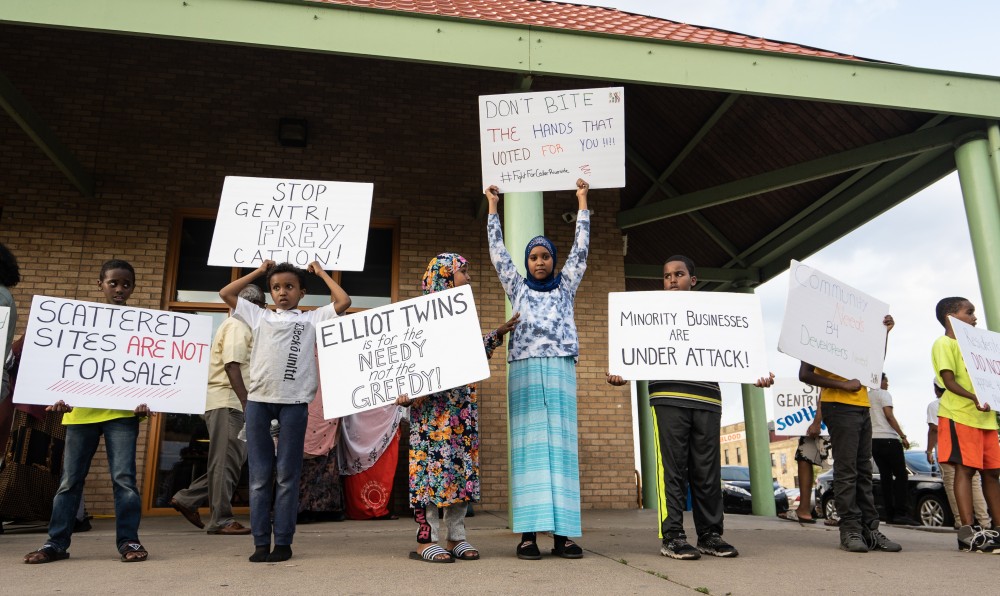Local officials rolled out a vision for an “African village” in Cedar-Riverside last month, but not all neighborhood residents agree the project is best for the community.
Ward 6 city council member Abdi Warsame, who represents the neighborhood, and Minneapolis Mayor Jacob Frey announced plans in late June to erect a Cedar-Riverside public market that would further a vision for an African village.
But some community members said the announcement came as a surprise. Local community group Somali Mothers of MN held a protest Sunday to rebuke the proposed project’s lack of community engagement and express concern about its potential effects on the dense neighborhood, such as impacts on crime and parking.
“The community didn’t even know before,” said Fartun Del, a founder of Somali Mothers of MN. “And knowing that, that nobody engaged [the community], brings them more suspicion and more anger.”
The proposed market is located on “Lot A,” a city-owned parking lot nestled against the Green Line light rail, across from Mixed Blood Theatre on Fourth Street South. Lot A rests less than a block from the namesake crossroads of Cedar Avenue and Riverside Avenue. The community has discussed development of Lot A for years.
“The African village concept is not just a market,” Warsame said. “Africa village concept is the people that live there. It’s the people that live in the towers, it’s the African immigrants, the culture, the languages.”
Warsame compared his vision to Chinatown or Little Italy in other cities. The market would support young African entrepreneurs, especially women of color, and create a regional destination, Warsame said.

Russom Solomon, owner of the neighboring Red Sea restaurant, said Frey and Warsame are “putting the cart before the horse.”
“First, engage the neighborhood, see what is best for this place and what people want. Go through the process,” Solomon said. “We’re not saying the city cannot develop this. They can develop it. But they have to listen to the community.”
He called the lack of recent engagement “unbelievably unique.”
Warsame said he believes much of the East African community supports the project. Warsame and Frey committed to create an African mall during the 2017 municipal elections, and the current vision for the market was publicly announced in late June 2019 at an East African Business Forum.
“It was in response to community members, the vast majority of Somali and East African Community members, expressing both a desire and a need for this kind of endeavor,” Frey said.
Warsame hopes the market will be an alternative to other African malls in Minneapolis, particularly those owned by Sabri Properties, which have drawn criticism for tenant exploitation. Warsame said the Cedar-Riverside market is “for the community, and it’s for the public — not a privately owned entity.”
Sabri Properties was unable to be reached for comment before publication.
Del, who also owns Sagal Restaurant in Cedar-Riverside, said the neighborhood, which is already among the densest in the city, cannot support a mall. She said energies should be focused on mitigating crime.
“My concern is that we need a mall, but we don’t need a mall in Cedar-Riverside, because we already have density,” Del said. “And to have a mall is going to bring more people, more crime, more drug use.”
But responding to concerns mentioned in the protest, Warsame said the mall will have the opposite effect by adding traffic to the area. The lot is one of the more problematic areas in Ward 6, having been the site of a recent homicide and ongoing drug deals, he said.
Multiple speakers at the protest, which saw over 100 attendees, said the neighborhood should prioritize recreational spaces for youth and elders.
Some community members said the timeline for development is aggressive and will make community engagement difficult.

“It’s a top down decision in the first place. Not very many people are aware of what’s going on,” said Solomon Cherne, a longtime resident of Cedar-Riverside who attended the protest.
The city’s Cedar-Riverside Small Area Plan, approved in 2008, suggests the area should maintain parking and diversify neighborhood housing options.
The nearby Riverside Plaza, which is home to more than 3,500 people, has approximately 850 private parking spaces throughout the complex. Lot A adds about 100 spaces to the area, which neighbors say are important to bring traffic to businesses.
Warsame said the market’s proposal could still include parking to help attract regional visitors.
Ladan Yusuf, an ally of the Somali mothers group and community organizer for the Defend Glendale and Public Housing Coalition, is concerned the project, which will also likely include housing, could gentrify the neighborhood. This concern was echoed by many protest attendees.
“We want to stop gentrification because this is going to be another luxurious apartment and with a very expensive mall that people cannot afford,” Yusuf said.

Warsame said if housing is built above the market, it would be affordable.
Some residents and business owners are also concerned a new market will create additional competition for African-owned businesses currently in the neighborhood.
“We don’t want it to jeopardize those businesses and bring in a new business. We have to think of the current businesses and elevate them up and do something for those businesses,” said Osman Ahmed, chairman of the Riverside Plaza Tenant Association.














